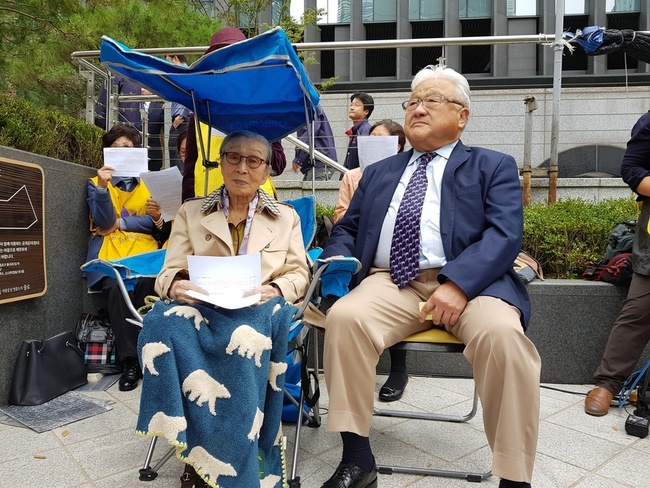 |
|
Honda sits next to the late Kim Bok-dong, comfort woman survivor and peace activist who passed away on Jan. 28, during a Wednesday Demonstration in Seoul in October 2017. (Hankyoreh archives)
|
Former US Congressman Mike Honda vows to continue fighting on comfort women issue
“Kim Bok-dong was a strong woman with a strong spirit, which is why I always went to pay my respects whenever I was in South Korea,” This was how how former US Congressman Mike Honda, 77, responded to the news that former comfort woman and peace activist Kim Bok-dong had passed away Jan. 28. In 2007, Honda led the House of Representatives resolution for rectifying the comfort women issue. During his tenure in the House of Representatives (from 2001 to 2017), Honda, who is of Japanese ancestry, fought tirelessly with the Japanese government on the comfort women issue, demanding a genuine apology. Honda, who is currently in Ethiopia, and despite the fact that it was almost midnight in local time when he was contacted on Jan. 29, agreed to a phone interview, describing the news as “important.” He directly referred to Kim Bok-dong as “Grandmother Kim Bok-dong” in Korean. The former congressman said, “I am very sad that Grandmother Kim passed away without receiving an apology from the Japanese government,” adding, “Now, there are only 23 [victims] left in South Korea. Now, more than ever, is the time to keep fighting for an apology from the Japanese government.” The former congressman has also been a frequent participant in the weekly Wednesday Demonstrations, held in Seoul in front of the Japanese Embassy. Kim was present at the demonstrations in October 2017, but when Honda visited in November she was hospitalized. “When I went to see her at the hospital, she thanked me for coming, and as we parted, asked that I teach [Japanese Prime Minister] Abe a lesson,” Honda said. “It was a request to receive an apology from him, no matter what.” ”Grandmother Kim may have passed away, but she is watching over us, expecting us to keep fighting without giving up,” he added. The importance of young people and Korean-Americans speaking out The former congressman emphasized the importance of future generations being educated on the past cruelties of the Japanese Empire. “What made me happy during my visits to the Wednesday Demonstrations was that I could notice an increase in the number of younger participants. Whatever happened in the past, if the younger generation is made aware, then our efforts were of value. This is why we keep pushing on.” Referring to the recent Democratic majority in the House of Representatives, Honda said, “In the United States, politicians must move more aggressively to ensure an apology from Prime Minister Abe, and Korean-Americans must come together to speak in one voice.” He added, “If Grandmother Kim were alive right now, she would say the same thing she said last year in the hospital.” “We must keep fighting for an apology, keep educating, and not forget our responsibility to Grandmother Kim and the other victims.” When asked about what he would say if he could speak directly to Prime Minister Shinzo Abe, Honda responded, “What I’ve been demanding for the past fifteen years. That Japanese leaders recognize the truth and their own responsibility, and issue an unambiguous apology. That is the only way that our children will learn about the past, and grow up to be citizens who understand that we must not trespass on human rights or inflict violence on women.” On the topic of Abe’s maternal grandfather, Nobusuke Kishi being a “class-A” war criminal, Honda said, “Because Abe’s family was part of the problem, Abe is afraid of losing face, or cannot find the courage to apologize,” and added that Abe should “apologize like a leader should.” By Hwang Joon-bum, Washington correspondent Please direct comments or questions to [english@hani.co.kr]






